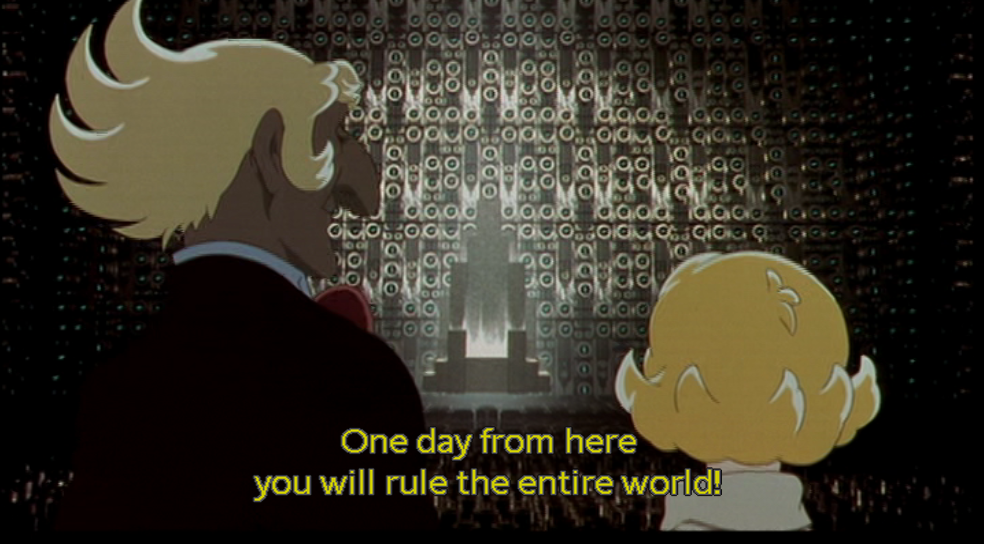Movie Review: Metropolis (2001) directed by Rintaro, aka Osamu Tezuka’s Metropolis
Private investigator Shunsaku Ban has come to Metropolis with his nephew Ken’ichi on the trail of Dr. Laughton, a mad scientist wanted for using human organs in illegal experiments. The police are shorthanded trying to do crowd control for the week-long celebration of Metropolis’ newest and biggest building, the Ziggarut. The best that the cops can do is lend a robot investigator to the pair to show them around the city. Although robots are not allowed human names, Ban gets around remembering its complicated serial number by nicknaming the robot “Pero”, his old dog’s name. Pero reasons that someone running illegal experiments won’t be on the surface, but in the underground Zone One, where the poor, both working class and dispossessed live.

What they don’t know is that Dr. Laughton is no longer using stolen human organs in his experiments. For one thing, it’s illegal. And also, they just won’t work for his current project. Duke Red, builder of the Ziggarut and big man around town, has commissioned Dr. Laughton to create an artificial copy of his dead daughter Tima. A robot, yes, but one designed to be indistinguishable from a human by sight, and destined to be so much more than a servant machine. Dr. Laughton has become enamored of his own incomplete creation, and plans to blow town with her as soon as he puts on the finishing touches.
This runs afoul of Rock, leader of the Marduks. They’re a fascist political gang not so secretly backed by Duke Red, and often act as a secret police. Rock, a war orphan raised by Duke Red, considers the older man his father, a sentiment Duke Red does not return. He does not want either for Dr. Laughton to cheat Duke Red by running off with the merchandise, nor for Tima to become the replacement child Duke Red wants and steal the man’s affection/rightful place as the inhabitant of the Throne of Power. Rock shoots the scientist and more or less accidentally sets the place on fire.
Ban and his nephew arrive at the scene too late to put out the fire, but Ken’ichi finds the seemingly amnesiac Tima and rescues her, while Ban catches up with the dying Laughton and inherits his notebook. The pair are separated. Ken’ichi must find his way through the depths of the city in an effort to bring Tima to safety, while Ban investigates Laughton’s murder while looking for his nephew. Rock, Duke Red and others pursue their own agendas What will become of the mighty Metropolis?
This 2001 film is loosely based on the 1949 manga of the same name by Osamu Tezuka, who was inspired by imagery from the 1927 Metropolis film directed by Fritz Lang. This was one of Tezuka’s first published works, and in tribute to that and the earlier film, the production crew chose some retro aesthetics for the movie. The character designs are “cartoony” and the musical score is heavy on 1920s jazz. Old-timey Hollywood wipe and iris transitions are used at various points.
Visually, the film is a treat. Long-time Tezuka fans will enjoy spotting their favorite “Star System” character designs and other visual references, as well as the interesting machine and robot designs. (Some audience members used to more “realistic” character designs for a serious movie may be uncomfortable.)
There’s a lot packed into the running time, and while there are some quiet scenes, the movie never dawdles. This does mean, however, that some plot points are “blink and you’ll miss it.”
The Ziggurat is explicitly compared to the Tower of Babel once for those who might have missed the symbolism, and indeed it is hubris that causes the final disaster (not helped one bit by Rock’s deliberate sabotage throughout the story.)
One thought, though. If you’re creating a perfect robot duplicate of your dead daughter, why make her the key to your ultimate superweapon if you know in advance that the process will wipe out all her memories and personality (and apparently looks, though that might be a glitch in the system?) Why not create one artificial person to be your daughter, and another to be the mindless destructive force that will wipe out your enemies? Of course, making an ultimate superweapon to ensure world domination is a bad idea to begin with, but I can’t expect would-be conquerors to listen to reason on that point.
Oh, and then there’s the classic philosophical exchange between Pero and Atlas, leader of the revolution.
Pero: Why do humans always resort to violence?
Atlas: (paraphrased) That’s a good question, and I’m going to sit down and think about it. Right after I destroy you and kill my enemies.
Atlas: (later, also paraphrased) Violence was a mistake, but not one I’m going to live to learn from.
Overall, a strong contender for best animated film of 2001, and well worth seeing if you haven’t already.


This movie played at the Uptown for a week in 2002.